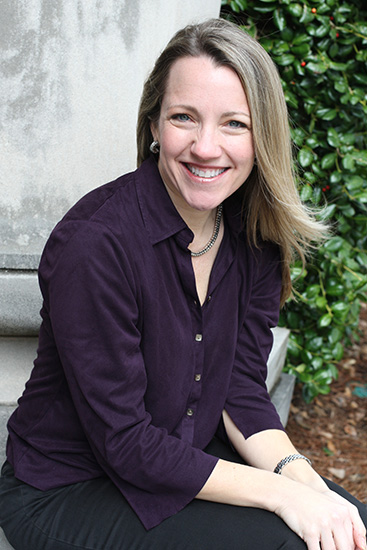
Position: Professor of English and Director of Creative Writing
Teaching at Samford since 1996
Bonus fact: Dr. Steward is a native Texan and has degrees from two private institutions in Texas.
Why do you teach? I’ve been a “teacher" in some form my whole life. My youngest brother is autistic, and I spent a lot of my childhood and teen years working with Charlie and helping him acquire language and the ability to express himself. I had no intention originally of entering this profession, but there were days in college poetry classes where the exchange of ideas and the beauty of language made palpably clear to me what Joseph Campbell meant about “following your bliss.” Teaching and learning are two sides of the same coin, and I teach because I love to learn.
What is one thing you want your students to know when they graduate from Samford? I want them to know that their learning has only just begun. If I have done my job, I’ve instilled in them a desire to learn and an ability to think critically for themselves so that from each day forward after graduation, the world is still their classroom.
What is your favorite hobby? Why? I love theatre. [Samford theatre professor] Don Sandley and I have a long running joke that I missed my calling. I have performed in professional theater, community theater and with a local comedic improvisation troupe. I’ve played roles ranging from the sublime to the ridiculous: Queen Margaret in Richard III on the one hand and Vidalia Prozac, presidential candidate of the Sweet Tea Party (whose slogan proclaims “If I can balance my meds, I can balance the budget!”) on the other. It’s true. There’s no business like show business.
How did your background prepare you for your current role at Samford? I wear many hats at Samford, and as such, my liberal arts training stands me daily in good stead. In college, I majored in English and minored in theater. As the director of creative writing, I teach students not only how to analyze a work of literature but how to put those ideas into the composition of a great poem. I also teach courses in modern drama and in film studies so that my training in textual analysis and performance converge.
What is your favorite genre of writing and why? Poetry. No question. Poet Ed Hirsch says that reading poetry, “is a way of connecting—through the medium of language—more deeply with yourself even as you connect more deeply with another. The poem delivers on our spiritual lives precisely because it simultaneously gives us the gift of intimacy and interiority, privacy and participation.” Or, as William Carlos Williams put it, “It is difficult / To get the news from poems / Yet men die miserably every day / for lack / of what is found there.” I could go on and on, but it just seems to me that poetry is the most beautiful, condensed expression of language. A poem is a thing there is no other way to say.
You are active in local theater circles. Is that an important creative outlet for you? Very much so! At its best, theater distills, or begins to distill, the complexity of lived experience onto a magical space, a stage. During a performance, a profound and one-of-a-kind relationship, never to be repeated exactly, is built between actors and the audience. We gather for a few hours and are held rapt by words, design and direction. Theater holds up a mirror in which we see ourselves and our values as a society. A play is simultaneously serious and urgent, yet also play-ful, joyful, full of the kind of free play and improvisation that children use to learn about the world around them.
What’s one thing that most students do not know about you? Most students don’t know that since 2000 I have studied Northern Shaolin Kung-Fu, T’ai Chi and meditation. My training in these contemplative arts informs everything I do from bringing as much mindfulness as I can to the classroom to actually teaching courses in literature and the contemplative arts. I currently hold a red sash, which means I am two sashes away from being a black belt. It’s a great thing; it really inspires my students to turn their work in on time.
